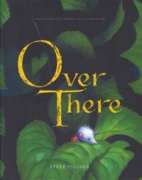
When Shredder, a little shrew who lives alone, overcomes his worry and sets out to explore what lies beyond the forest, he finds himself in trouble and discovers a new friend.

When Shredder, a little shrew who lives alone, overcomes his worry and sets out to explore what lies beyond the forest, he finds himself in trouble and discovers a new friend.
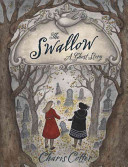
In 1960s Toronto, two girls retreat to their attics to escape the loneliness and isolation of their lives. Polly lives in a house bursting at the seams with people, while Rose is often left alone by her busy parents. Polly is a down-to-earth dreamer with a wild imagination and an obsession with ghosts; Rose is a quiet, ethereal waif with a sharp tongue. Despite their differences, both girls spend their days feeling invisible and seek solace in books and the cozy confines of their respective attics. But soon they discover they aren’t alone–they’re actually neighbors, sharing a wall. They develop an unlikely friendship, and Polly is ecstatic to learn that Rose can actually see and talk to ghosts. Maybe she will finally see one too! But is there more to Rose than it seems? Why does no one ever talk to her? And why does she look so… ghostly? When the girls find a tombstone with Rose’s name on it in the cemetery and encounter an angry spirit in her house who seems intent on hurting Polly, they have to unravel the mystery of Rose and her strange family… before it’s too late.
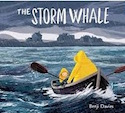
Every day, in a house by the sea, a little boy watches his father leave for a long day’s work. One night, a great storm washes a small whale onto the beach. The boy discovers the whale is a good listener. The father discovers the boy is lonely. Together, they return the whale to the sea. And from that day on, the boy learns that the father can be a good listener too.

Once upon a time in a very busy city, on a very busy street, in two very small apartments, lived Herman and Rosie. Herman liked playing the oboe, the smell of hot dogs in the winter, and watching films about the ocean. Rosie liked pancakes, listening to old jazz records, and watching films about the ocean. They both loved the groovy rhythm of the city, but sometimes the bustling crowds and constant motion left them lonely. One day, they lost their job and they lost the urge to play music. Finally they came to listen to each other’s music.
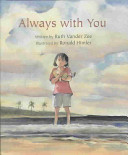
Orphaned at the age of four when her village in Viet Nam is bombed, Kim is rescued by American soldiers and raised in an orphanage, always finding comfort in her mother’s last words: “Don’t be afraid. I will always be with you.”
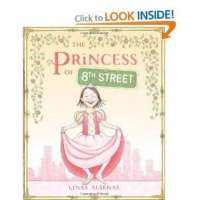
A shy little princess, on an outing with her mother, gets a royal treat when she makes a new friend.
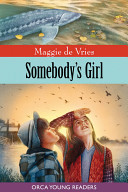
Martha knows she is adopted, but she’s okay with that, at least until her mother gets pregnant. Suddenly she’s no longer number one. She picks fights with her closest friends and, to make matters worse, she is forced to do a school project about sturgeon with Chance, an oddball boy in her class. When Martha’s birth mother announces that she is getting married and moving away, a lonely and confused Martha realizes that she needs to figure out a way to be a better friend and daughter, and an even better sister.
It’s the early half of the 19th century in coastal Nova Scotia, and almost-ten-year-old Ellie is adjusting to the recent death of her mother. But just when she finally begins to feel happy again, Ellie and her father move to remote Sable Island, a tiny, windblown crescent of grass and sand in the Atlantic. While her father works, Ellie explores the island, feeling alone and furious with her pa for making them leave their beloved home. Even meeting a spirited island girl named Sarah does little to dispel her anger and grief. Then one afternoon, Ellie encounters a wild stallion grazing on the dunes, and slowly forges a secret connection with the beautiful horse she names Orchid. But Ellie soon learns that Orchid and his family are threatened, and it may be up to her to save them. Based on historical fact, this early chapter book is a touching exploration of loss and loneliness and the redemptive power of love and friendship.
No one believes Larf exists, and he likes it that way. Larf, you see, is a sasquatch, the only sasquatch in the world (or so it seems). He has a very pleasant, and very private, life in the woods, where on any given day he might be found jogging, gardening or walking Eric, his pet bunny. But everything changes one morning when Larf discovers that another sasquatch is scheduled to make an appearance in the nearby city of Hunderfitz. That must mean he’s not the only sasquatch in the world! Excited by the prospect of having a friend to share hair grooming tips with, Larf disguises himself as a city slicker and heads for Hunderfitz — where he’s in for a couple enormous surprises.
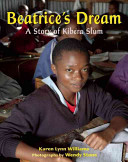
Beatrice is a thirteen-year-old orphan in Kibera, Nairobi – a Kenyan shantytown built on refuse and rubbish and one of the biggest slums in Africa. In this book she describes her life: her walk to school, the dust that blows between her teeth and the mud she wades through, her teacher’s down-to-earth encouragement, her fear of being alone, how safe she feels at school…This sensitive account in words and photographs reveals the realities of life for some of the world’s most deprived people – and offers hope as Beatrice follows her dream.
About Kibera slum: Kibera is in Nairobi, the capital city of Kenya, in east Africa. It is one of the largest slums in the world with over half a million people living there – about a quarter of the population of Nairobi. The slum covers 2.5 square kilometres (630 acres). There are no roads and few of the residents have modern toilets, clean drinking water or electricity. The crime rate is high and disease spreads rapidly in the unsanitary conditions. Many people come to Kibera from rural areas to look for jobs in the city. A large proportion of the children have become orphans because so many adults have died from AIDS – many people in Kibera are infected with the HIV/AIDS virus. A number of organizations work in the slum offering medical care, finding jobs and houses, and encouraging people to take part in sports and education. KIKOSHEP (Kibera Community Self-Help Program) provides care and advice for people with HIV/AIDS. They also have a youth center where youngsters like Beatrice can go for health information and advice. The center shows films and arranges sports and social events.
I first met Beatrice at the KIKOHEP primary school. Since then, she has graduated at the top of her class and is eligible to go on to secondary school. In Kibera, this is most children’s dream – they see education as the best way to escape from the slum. But sadly, many girls are sent away by their families into arranged marriages or end up on the street as prostitutes, so they are never able to realize their dream. The Kenyan Government and the United Nations have now started building new homes in Kibera so that they can move thousands of people out of the slum into better living conditions.